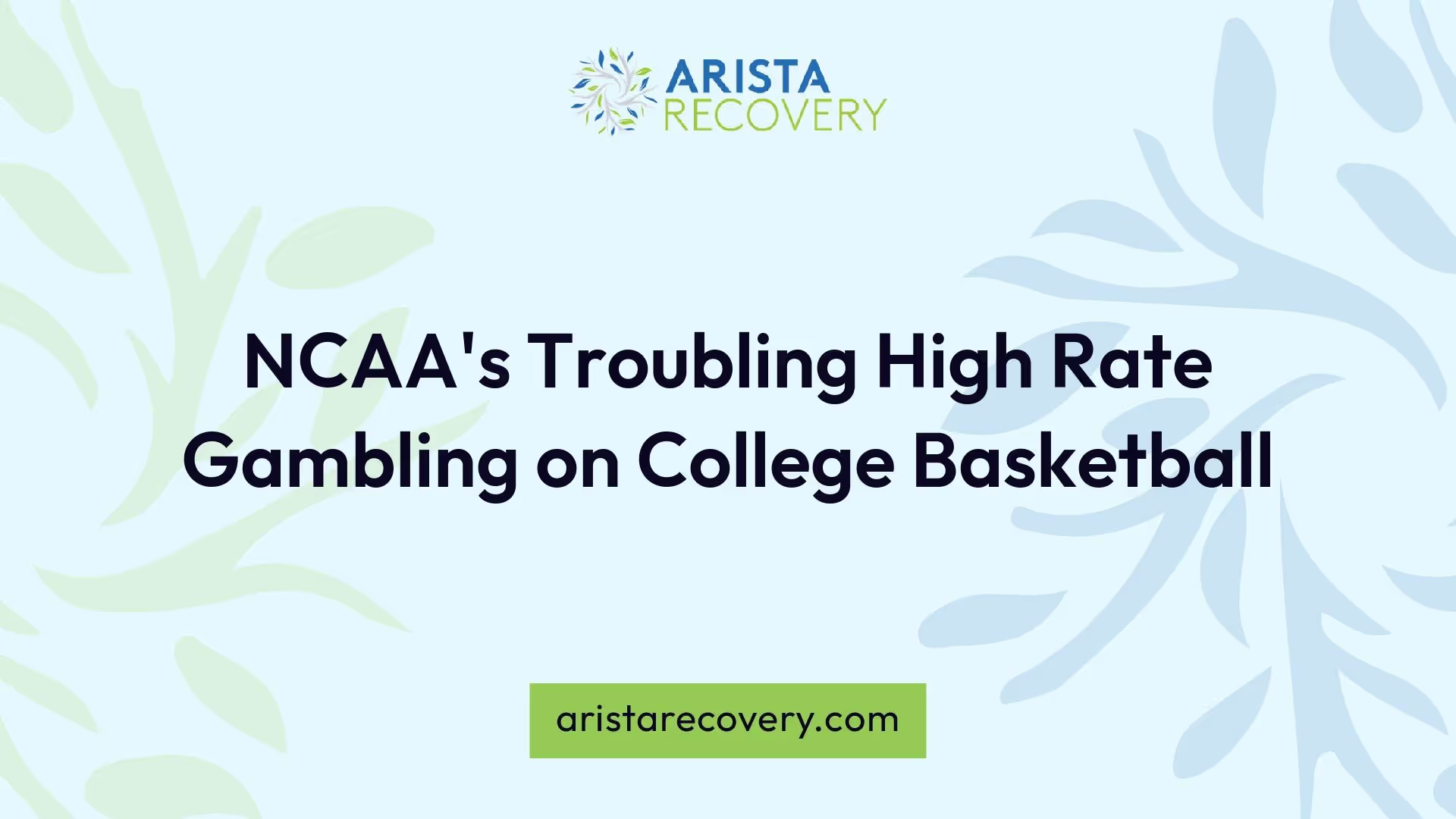
NCAA's Troubling High Rate Gambling on College Basketball
Gambling Trends in College Athletics
The landscape of college athletics is increasingly intertwined with sports betting, raising concerns about the implications for student-athletes and their peers.
Sports Betting Among Student-Athletes
Gambling among student-athletes is a notable trend. According to a study, approximately 57% of male student-athletes and 39% of female student-athletes reported engaging in some form of gambling during the previous year. Specifically, around 26% of male student-athletes admitted to betting money on sports (Prescott House).
GenderPercentage Engaged in GamblingPercentage Betting on SportsMale Student-Athletes57%26%Female Student-Athletes39%N/A

College Students' Gambling Habits
The prevalence of gambling extends beyond just student-athletes to the general college population. A 2023 NCAA survey revealed that 58% of young people aged 18-22 had placed at least one sports bet. Among students living on campus, this figure rose to 67%, indicating widespread participation in sports wagering activities (Prescott House).
GroupPercentage Who BetYoung People (18-22 years)58%Students Living on Campus67%
These statistics highlight the concerning trend of gambling among college students, including student-athletes, which poses risks to their well-being and athletic integrity.
Impact of Sports Wagering
The rising trend of sports wagering, particularly in college basketball, brings with it significant consequences for student-athletes and the broader college community. This section examines the risks associated with college gambling and the psychological effects this behavior can precipitate.
Risks Associated with College Gambling
Engaging in gambling activities poses various risks for college students, particularly within the context of sports wagering. Research highlights that college students involved in gambling are more likely to participate in additional high-risk behaviors. Some findings indicate that:
Risk FactorPercentageStudents engaging in risky behaviors (e.g., alcohol/drug use)16%Students losing over $500 on sports betting in one day6%
These statistics underscore the potential dangers associated with gambling, as those who participate may find themselves in a cycle of risk that could extend beyond financial losses.
Psychological Effects of Betting
The risks of gambling aren't solely financial; they also encompass significant psychological repercussions. Engaging in sports betting can lead to various symptoms of gambling disorder among college athletes. Key psychological effects include:
These factors can create a distressing mental state that impacts not only the students’ academic and athletic performance but also their overall well-being. The thrill and excitement that come with gambling can encourage addictive behaviors, making it crucial to understand these impacts in relation to the high rate of gambling in college basketball.
NCAA Regulations and Initiatives
The NCAA has established a framework of regulations and initiatives aimed at addressing the troubling high rates of gambling on college basketball. These policies are designed to protect student-athletes, ensure competition integrity, and promote responsible behaviors regarding sports wagering.
NCAA Disciplinary Policies
The NCAA implements strict disciplinary policies concerning sports betting practices. Student-athletes face severe consequences for involvement in activities intended to influence the outcomes of games. Such actions can result in a permanent loss of collegiate eligibility across all sports (Prescott House). The NCAA rules prohibit participation in any sports betting activities and the sharing of information related to any form of sports wagering involving intercollegiate, amateur, or professional athletics competitions. This policy applies universally to student-athletes, coaches, and athletics staff members, protective of both the participants and the sport (NCAA).
Disciplinary ActionDescriptionPermanent Loss of EligibilityInvolvement in influencing game outcomesProhibition on Sports WageringComplete ban on sports betting activities for student-athletes, coaches, and staff
Educational Programs on Sports Wagering
To complement its disciplinary policies, the NCAA has developed educational programs focused on sports wagering. These initiatives aim to inform student-athletes and staff about the potential risks associated with gambling and the implications of violating NCAA policies. The organization promotes responsible gambling practices and emphasizes the negative impact of gambling addiction, especially in a college setting.
The NCAA has also been advocating against player-specific prop bets in collegiate sports. This initiative is designed to protect student-athletes from harassment and potential exploitation while ensuring the integrity of the competitions they participate in.
Educational InitiativeGoalWorkshops on Gambling RisksRaise awareness among student-athletesAdvocacy against Prop BetsProtect students from harassment and maintain integrity
Through these regulations and educational programs, the NCAA aims to create a supportive environment that mitigates the risks associated with high rates of gambling in college basketball, ensuring the well-being of student-athletes and the overall integrity of the sport.
National Awareness and Collaborations
NCAA Survey Insights
The NCAA takes proactive measures to assess the prevalence and impact of sports gambling among college athletes. Every four years, the NCAA conducts a comprehensive national survey in collaboration with scholars at the International Centre for Youth Gambling Problems and High-Risk Behaviors at McGill University. This survey involves over 20,000 student-athlete participants and aims to gather insights on sports wagering attitudes and behaviors among NCAA athletes and other youth populations.
The following table summarizes the relevant details of the survey:
Survey YearParticipantsFocusEvery 4 yearsOver 20,000Student-athlete sports wagering
In addition to evaluating trends, the survey also assesses threats to contest integrity and the well-being of student-athletes. The insights gained from these surveys guide the NCAA's initiatives and policies related to gambling in college sports.
Collaboration with External Entities
The NCAA recognizes the importance of collaborating with various stakeholders to effectively address concerns related to gambling activities in college athletics. To this end, the organization has initiated partnerships with sports betting entities and external organizations. These collaborations focus on promoting responsible betting behavior and maintaining the integrity of college sports (Attain Behavior Health Solutions).
Moreover, the NCAA's research department is continuously gathering data related to trends in sports wagering, which helps in formulating educational programs and resources aimed at both players and coaches. The goal is to create awareness and provide essential tools to combat the risks associated with gambling in college basketball.
These collective efforts indicate the NCAA's commitment to ensuring student-athlete safety and well-being in an era of increasing sports betting.
Sports Betting Challenges
As sports wagering becomes increasingly prevalent, the NCAA faces significant challenges, particularly regarding contest integrity and issues surrounding prop bets and harassment.
Threats to Contest Integrity
The expansion of legalized sports betting following the U.S. Supreme Court's decision to declare the Professional and Amateur Sports Protection Act unconstitutional in 2018 has raised concerns about the integrity of college sports. With 33 states and the District of Columbia allowing wagers on athletic competitions, the potential for manipulation and cheating has increased (NCAA).
To combat these threats, the NCAA prohibits student-athletes, coaches, and athletics staff from participating in sports betting activities, which is crucial for maintaining the integrity of competition (NCAA). The association actively researches trends in sports wagering attitudes through national surveys involving over 20,000 participants, evaluating its impact on contest integrity and student-athlete well-being.
Prop Bets and Harassment Issues
Prop bets, which target individual player performances rather than team outcomes, create unique challenges that have garnered NCAA attention. These types of wagers not only threaten competition integrity but also increase the risk of harassment toward student-athletes.
In response to these concerns, the NCAA advocates for the elimination of player-specific prop bets in collegiate competitions. Several states, including Ohio, Vermont, Maryland, and Louisiana, are taking actions to prohibit such bets, with Ohio collaborating with gaming regulators to remove them statewide.
The NCAA's effort to address these challenges includes partnerships with organizations like EPIC Risk Management to provide educational resources aimed at preventing gambling harm among student-athletes. Over 10,000 individuals from NCAA member schools have benefitted from these programs. As the conversation around sports betting evolves, understanding these challenges is essential for safeguarding the integrity of college athletics.
Promoting Mental Health
Addressing Mental Health Concerns
The mental health of student-athletes is increasingly at risk due to the culture of sports betting that surrounds college athletics. Studies and anecdotal evidence reveal that many student-athletes face harassment and abuse due to gambling-related expectations from fans and bettors. For example, North Carolina men's basketball player Armando Bacot publicly shared his experience of receiving abusive messages linked to his performance after a game. This incident underscored how sports betting impacts the mental well-being of young athletes, paving the way for legislative measures aimed at protecting them.
To combat this issue, the NCAA has initiated educational programs that have reached over 55,000 student-athletes. These programs educate participants about the risks associated with sports betting and problem gambling, aiming to foster a healthier environment for athletes.
Educational Program StatisticsNumbersStudent-athletes educated55,000Awards wonPlayer Protection Initiative of the Year at the 2024 SBC Summit
NCAA's Draw the Line Campaign
The NCAA's "Draw the Line" campaign is a proactive initiative designed to raise awareness about the potential dangers of sports wagering and its effects on mental health. The campaign seeks to eliminate player-specific prop bets, which not only target individuals for harassment but also threaten the integrity of competitions. States such as Ohio, Vermont, Maryland, and Louisiana have already begun to take legislative action to prohibit these types of bets.
Furthermore, the NCAA is collaborating with organizations like Signify Group to implement artificial intelligence monitoring systems aimed at detecting and responding to online abuse directed at student-athletes, coaches, officials, and committee members. This strategy reflects the NCAA's commitment to addressing harassment as part of its broader mental health and support initiatives for student-athletes during the competitive season.
Through these campaigns and educational efforts, the NCAA aims to create a safer environment for student-athletes, ensuring their mental health and well-being are prioritized amidst the challenges posed by a betting culture.
When mental health challenges and addiction intersect, it can feel isolating. At Arista, we offer compassionate, evidence-based, and trauma-informed care to help you heal, grow, and move forward.
You’re not alone in this.
When mental health challenges and addiction intersect, it can feel isolating. At Arista, we offer compassionate, evidence-based, and trauma-informed care to help you heal, grow, and move forward.
Support that moves with you.
You’ve taken a brave first step. At Arista Recovery, we’re here to help you continue with best-in-class care designed for long-term healing and support.
.webp)






